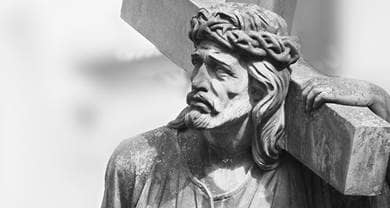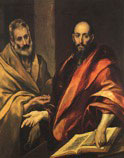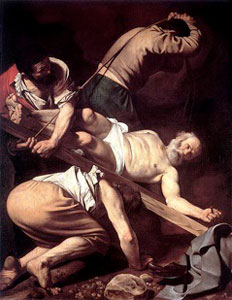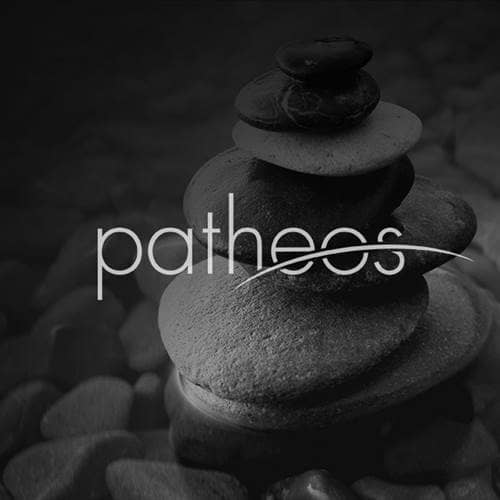- Trending:
- Pope Leo Xiv
- |
- Israel
- |
- Trump
- |
- Social Justice
- |
- Peace
- |
- Love

RELIGION LIBRARY
Christianity
Founders
In Matthew 16:18, Jesus said to the apostle Peter, "And I tell you that you are Peter, and on this rock I will build my church." Based in part on this passage from scripture, the Roman Catholic Church has a strong tradition that Jesus founded the Church and appointed Peter as its first leader. The Eastern Orthodox and Protestant traditions, on the other hand, do not agree that Peter had any greater authority than Paul or the other apostles.
Although it is not entirely clear from the historian's perspective that Jesus intended to found a new religion, it is clear that a new religion was ultimately founded in Jesus' life and teachings. This would not have happened if his grieving followers had not become persuaded of the reality of Jesus' resurrection. Belief in the resurrection was central to the faith of the early Christians. The apostle Paul wrote in his first letter to the Corinthians, "If Christ has not been raised, our preaching is useless and so is your faith" (1 Corinthians 15:14).
Jesus was executed around the year 30 C.E., and according to the Acts of the Apostles, the Pentecost happened seven weeks later. On that day, Peter preached the first "Christian" sermon (Acts 2). It was a simple sermon in which Peter proclaimed that Jesus was the awaited Messiah, and that the Jews were living through the last days before the "day of the Lord," when God would judge the world and it would come to an end. He called on his listeners to repent of their sins and be baptized as a sign of rebirth.
 Thirty years later, Christian communities were found in most towns in the eastern Mediterranean, and as far west as Rome. This can be attributed to the dedicated efforts of Jesus' followers, who believed they were empowered by the Holy Spirit, to evangelize, or convert, people to belief in Jesus as the resurrected Messiah, or Christ. The two most important and influential evangelists were Peter and Paul.
Thirty years later, Christian communities were found in most towns in the eastern Mediterranean, and as far west as Rome. This can be attributed to the dedicated efforts of Jesus' followers, who believed they were empowered by the Holy Spirit, to evangelize, or convert, people to belief in Jesus as the resurrected Messiah, or Christ. The two most important and influential evangelists were Peter and Paul.
Peter is the key figure in Acts 1-12. He took the lead in the early days, healing and preaching. Although the first years of his ministry were concentrated in Jerusalem among the Jews, he is also said to have had an interest in the mission to Samaria. Peter shared leadership of the Jerusalem Christians with James, who was the head of the Church in Jerusalem. James is believed to have been the brother of Jesus.
Paul is the other key figure in the Acts of the Apostles. His career is the concern of Acts 12-28. While not a companion of Jesus, Paul experienced a profound and disturbing vision of Jesus, and became a passionate missionary. Paul concentrated his ministry in the towns outside the Jewish province of Palestine, around the eastern Mediterranean and west to Rome. While Peter focused his evangelism among the Jews of Jerusalem, Paul's evangelical mission to the Roman provinces of the eastern Mediterranean and beyond extended his message to Gentiles as well as Jews.
In the years before the life of Jesus, there were many Greek-speaking, non-Jewish devotees of Judaism in the Roman Empire. Called "God-fearers," these individuals were not full converts and were therefore not required to be circumcised or to keep the other strict Jewish rituals. Many of the early Gentile converts of Paul were "God-fearers." By embracing the Christian gospel, they were often entering into largely Jewish communities.
As both Jews and God-fearers joined the ranks of the early Christians, these Christian communities faced their first major dispute. Christian Jews showed their commitment to the God of the Jewish scriptures, who is also the Christian God, by keeping the Jewish religious laws as they always had. God-fearers did not have the same dedication to the laws and religious rites of traditional Judaism. Did all converts to Christian faith have to keep all Jewish religious laws?
Although more than one issue was at stake, the real tension circled around the question of circumcision. Did adult males wishing to be baptized also have to undergo circumcision? The problem arose in Antioch in Syria, when representatives of the Jerusalem Church reportedly began telling new converts that they could not be saved unless they were circumcised. Essentially, they argued that becoming a Christian, a follower of Jesus, who was Jewish, meant practicing all the older Jewish customs as well.
Paul, who was preaching in Antioch at the time, disagreed. Senior Christian leaders tackled this problem by holding the first Church council, the Council of Jerusalem. Accounts of this meeting are found in chapter 15 of the Acts of the Apostles, and in the second chapter of Paul's letter to the Galatians. Paul and a companion, Barnabas, traveled from Antioch in Syria to Jerusalem to meet with the elders of the Jerusalem Church, including Peter and James, in order to reach agreement on the touchy question of Jewish law and non-Jewish converts.
According to Acts and Galatians, Paul and his followers prevailed on the question of circumcision. In a decision issued by James, the Council affirmed that new converts were excused from following most of the requirements of Jewish law, including circumcision. However, all Christians were required to follow some of the Jewish dietary restrictions, as well as prohibitions against sexual immorality and idolatry.
 The Council of Jerusalem, and James's decree, may represent the first episode in which the early Christians differentiated themselves from Judaism. While it would take time for Christianity and Judaism to completely divide, the die was cast. For many years, the relationship between Jews, Jewish Christians, and Gentile Christians was fluid and indeterminate.
The Council of Jerusalem, and James's decree, may represent the first episode in which the early Christians differentiated themselves from Judaism. While it would take time for Christianity and Judaism to completely divide, the die was cast. For many years, the relationship between Jews, Jewish Christians, and Gentile Christians was fluid and indeterminate.
Christians believe that Peter ultimately settled in Rome, and was crucified there, probably during the persecution of Christians by the Emperor Nero (c. 64). Christians also believe Paul was executed in Rome, by beheading, also during the persecution of Christians by the Emperor Nero. These traditions have contributed to the special prestige Rome has for many Christians, particularly Roman Catholics.
Study Questions:
1. What event within Jesus' life made him central to the Christianity movement?
2. Why were Jesus' disciples important founders of Christianity?
3. Who was Peter? Who was Paul? What did they contribute?
4. How did Jewish tradition affect the development of early Christianity?
5. When did Christianity separate from Judaism? How?










